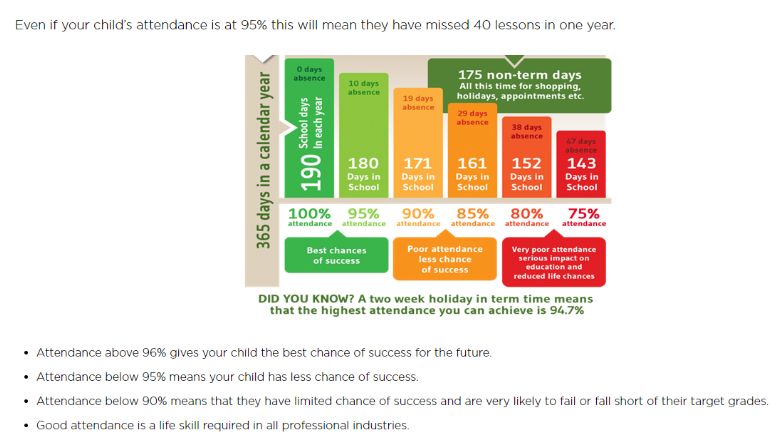Attendance
We believe that all parents want the best for their children and having a good education is important to ensuring that they have the best opportunities in life. We understand that all children get sick from time to time, and are always here to support you with the school attendance of your child.
CHANGES TO ATTENDANCE PROCESSES FROM SEPTEMBER 2024
We will refer to EIPT (Education Inclusion Partnership Team) for:
- 10 sessions of unauthorised absence or more in any 10-week period
- Any unauthorised leave of absence of 5 consecutive days or more
- Where a pupil has accumulated a minimum of 10% unauthorised absence across the year
A referral could result in:
- A fixed penalty notice of £160 (reduced to £80 if paid within 21 days) for a first referral
- A fixed penalty notice of £160 for a second referral
- Consideration of prosecution for a third referral within a 3-year period.
Our Statement on Attendance
At St Mary’s, we aim to create a safe, happy and inclusive environment, in keeping with our whole school vision of “Do everything in Love” (1 Cor 16:14). We demonstrate this through: loving ourselves, others and the world. We believe that in order for children to achieve their full potential, they must attend school every day. In order to facilitate this, we recognise the impact that our work in other areas – such as an interesting curriculum, positive relationships with pupils and families & an inclusive environment, alongside the use of resources such as pupil premium – can have on improving attendance.
We are committed to:
- Promoting and modelling high attendance and its benefits
- Ensuring inclusivity, equality and fairness for all.
- Ensuring this approach is clear and easily understood by staff, pupils and parents.
- Intervening early, building positive relationships with families to overcome barriers.
- Working collaboratively with other agencies and schools in the area
- Ensuring the framework set in section 7 of the Education Act 1996, is adhered to by all parents.
- Regularly monitoring and analysing attendance data to identify pupils or cohorts that may require more support.
What to do if your child is going to be absent from school
- Please contact the school (01536 485500) every day when your child is absent, providing the school with a reason and estimated time/date of return.
- The school adheres to NHS guidance on infection control and will send a child home if a child is deemed an infection risk. The guidance includes the 48-hour rule for diarrhoea and vomiting, in which a child will not be able to be on site for 48 hours following their last movement.
- Parents/Carers will be asked to complete an absence request form for any upcoming absence they are aware their child will have from school, such as medical appointments - you can find a downloadable pdf below.
- Please be aware that any holiday taken in term time will be recorded as unauthorised absence.
- Should a child become unwell at school, they may be sent home.
Important attendance contacts at school
- School Office - 01536 485500
- Head Teacher - Diane Wright (please contact via the school office)
- Senior attendance lead - Hannah Starkey (please contact via the school office)
- School attendance lead - Ben Collins (please contact via the school office)
Attendance information and support
We all want the best for our children and having a good education is really important. A child’s future will be affected if they do not attend school regularly (over 96% of the time).
Every School Day Counts
100% attendance = Coming to school every day
90% attendance = 4 weeks of education lost per year
80% attendance = Over 1/2 a term of education lost per year
70% attendance = More than 1/4 of education lost per year
An average of 90% attendance over a child’s educational career = 1 whole year of education lost
5 minutes late every day = 3 full school days lost per year
15 minutes late each day = 2 full school weeks a year lost per year
Children who don’t attend school over 95% of the time:
What does the law say
- All natural parents whether married or not
- Any person who, although not a natural parent, has parental responsibility e.g. step parents, grandparents etc.
- Any person who, although not a natural parent, has care of the child or young person during the absence
Separate notices may be issued to each person.
Types of absence
Unauthorised absence — when children miss school without permission, for example a birthday treat, a day trip, over-sleeping, taking a long weekend, family holiday or shopping.
Authorised absence — only the headteacher can authorise absences. You must apply for permission every time and they may also request further evidence to support the reasons. The school should inform you of their procedure. If your child is too ill to attend, you should inform the school and give them an idea of when they will return. It’s important to stay in touch with the school about longer term illness so that they can work with you to minimise disruption to your child’s learning.
Supporting good attendance
If your child is anxious or worried about going to school, ask the school for help, we will support you.
School refusal
School refusal is often known as Emotional Based School Avoidance (EBSA). For many children it’s a temporary state, but for some families it is more serious. We understand the stress and pressure this can put on a family, so please talk to school as soon as you are worried. The School Wellbeing Team has many options that they can explore to support you and your family in making sure that your child can access education.


Is my child too ill for school?
Find out when it's best to keep your sick child at home and when it's OK to send them to school or nursery.
https://www.nhs.uk/live-well/is-my-child-too-ill-for-school/

